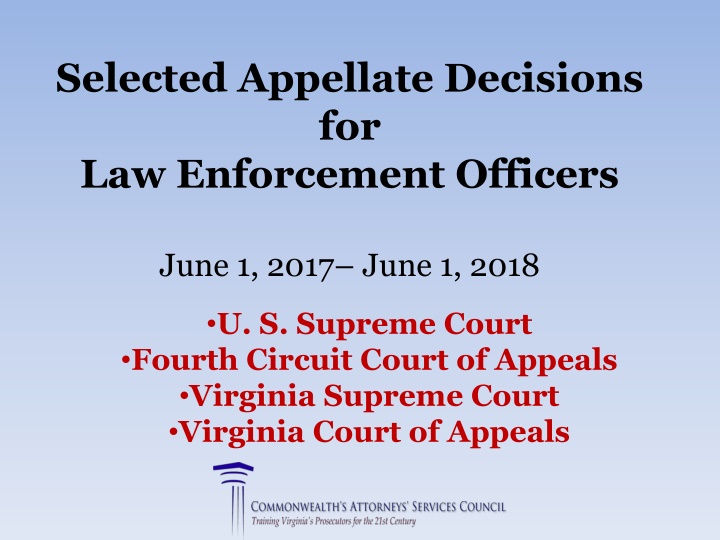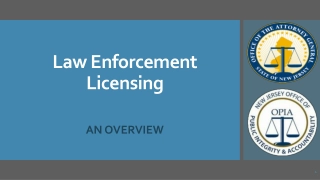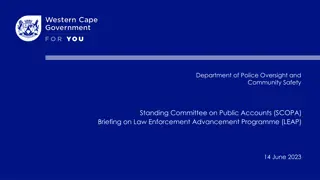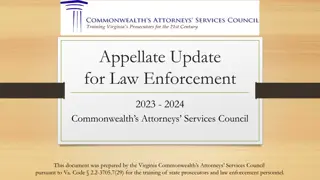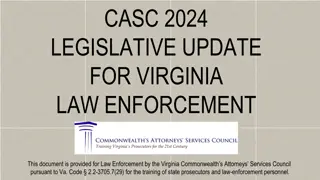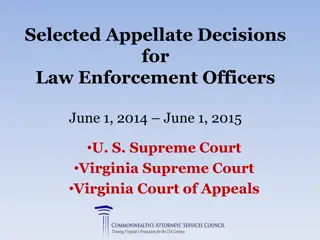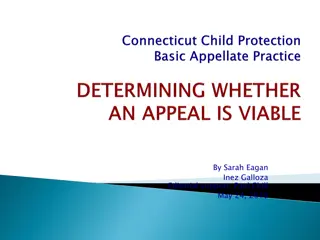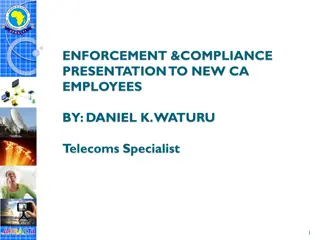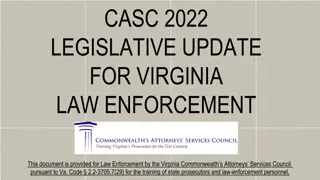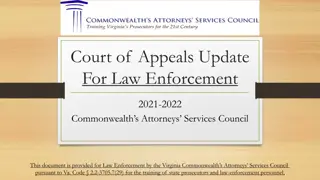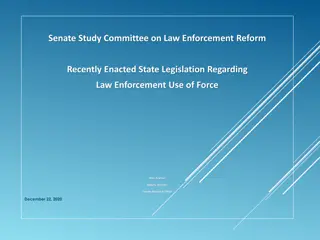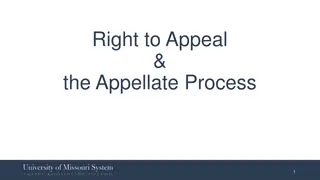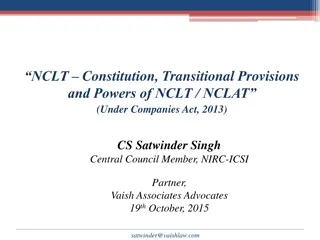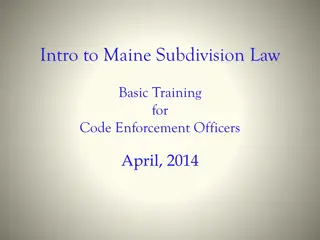Appellate Decisions Impacting Law Enforcement Officers: Summary & Updates
This collection covers selected appellate decisions impacting law enforcement officers from June 1, 2017, to June 1, 2018. It includes insights from the U.S. Supreme Court, Fourth Circuit Court of Appeals, Virginia Supreme Court, and Virginia Court of Appeals. Topics include Fourth Amendment, Fifth Amendment, crimes against persons and property, drug and gun offenses, DUI, traffic offenses, and evidentiary issues. The presentation discusses new cases on interviews and interrogations, highlighting a case concerning coercion and Miranda waiver. Notably, evidence was suppressed in a case involving manipulation tactics by police during an investigation. The material also touches on a DUI investigation involving a driver's non-compliance leading to forceful measures by officers.
Download Presentation

Please find below an Image/Link to download the presentation.
The content on the website is provided AS IS for your information and personal use only. It may not be sold, licensed, or shared on other websites without obtaining consent from the author.If you encounter any issues during the download, it is possible that the publisher has removed the file from their server.
You are allowed to download the files provided on this website for personal or commercial use, subject to the condition that they are used lawfully. All files are the property of their respective owners.
The content on the website is provided AS IS for your information and personal use only. It may not be sold, licensed, or shared on other websites without obtaining consent from the author.
E N D
Presentation Transcript
Selected Appellate Decisions for Law Enforcement Officers June 1, 2017 June 1, 2018 U. S. Supreme Court Fourth Circuit Court of Appeals Virginia Supreme Court Virginia Court of Appeals
Please refer to 2018 Appellate Update Master List for a complete listing of new cases of interest to law enforcement officers.
Topics for Presentation Fourth Amendment Fifth Amendment Crimes Against Persons Crimes Against Property Drug & Gun Offenses DUI and Traffic Offenses Evidentiary Issues
New Cases on Interviews & Interrogations FIFTH AMENDMENT
Coercion: U.S. v. Giddins Police seized defendant s car during bank robbery investigation. Defendant visits police station to get his car back. The officers told him that he was free to go, but that they had some questions for him. The defendant asked if he was in trouble , but the police told him that he was not and they were only asking about the car s involvement in the offenses.
Police Obtain Miranda Waiver The officers asked the defendant to sign a Miranda waiver. The defendant asked if this was the procedure to get his car back, as the car was essential to his livelihood. The officers told him: Yeah in order for us to ask you questions, because the vehicle was used in a crime, by law, we have to go over these rights Before I release the car to you, I would like to know some answers . . . I would like to know some answers before we release your car back to you.
Court: Evidence Suppressed A reasonable person would have felt unable to cease the interview and thus forfeit the opportunity to obtain the return of the vehicle. Police affirmatively deceived the defendant to obtain his Miranda waiver by failing to inform him that he was the subject of the investigation when he asked whether he was in trouble , which added to the compulsion. U.S. v. Giddins, 858 F.3d 870 (2017)
Granado: DUI Investigation Two officers approached a car stopped on the road, and ordered the driver to show his hands. Defendant repeatedly refused to show his hands The officers drew their weapons, forcibly removed him from the car, and handcuffed him until they could determine whether he had any weapons. From then on, the officers did not use threatening language. The officers did not tell the defendant that he was under arrest, nor did they put him in a police car.
Held: Statements Admissible The Court ruled the defendant was not in custody for purposes of Miranda and that the officers merely put him in investigative detention. The Court distinguished the Dixon and Hasan cases, finding that a reasonable person would not have believed that he was under arrest at the time that he made statements. Drawing weapons, handcuffing a suspect, placing a suspect in a patrol car for questioning, or using or threatening to use force does not necessarily elevate a lawful stop into custody. Granado v. Commonwealth, December 5, 2017 (Unpub)
Diggs: Non-Police Custody Defendant was a patient at a secure mental health treatment facility due to a recent suicide attempt. The defendant was hydrocephalic, has a 9th-grade education, and suffered from emotional and psychiatric problems. An officer investigating a sexual assault interviewed the defendant at the facility. The officer did not read Miranda warnings. The officer told the defendant that he was not under arrest and made clear that he was free to leave.
Held: Statements Admissible Court: The question is whether police subjected him to a formal arrest or restraint on freedom of movement of the degree associated with formal arrest. In this case, the Court ruled that the interview by a single officer in a neutral setting was not a custodial interrogation and therefore did not require Miranda warnings. Diggs v. Commonwealth, Unpublished (January 30, 2018)
New Cases on Search & Seizure FOURTH AMENDMENT
Cars and Curtilages Officer saw a motorcycle under a tarp in a driveway and had probable cause to believe it was stolen. Officer walked up the driveway, past the path to the front door, and lifted the tarp, confirming it was the stolen motorcycle. Virginia Supreme Court found search lawful under the Carroll doctrine finding that searching a car does not require a warrant if the officer has probable cause.
U.S. Supreme Court: Carroll does not apply in Curtilage Court: The automobile exception to the 4th Amendment does not permit a police officer, uninvited and without a warrant, to enter the curtilage of a home in order to search a vehicle parked therein. The Court likened this case to a situation where an officer sees contraband inside a home through a window, which would also require a warrant. Collins v. Virginia, May 29, 2018
Byrd: Rental Cars Defendant s girlfriend rented a car and allowed him to drive it, even though he was not an authorized driver and allowing him to do so violated the rental agreement Police stopped the car and found drugs. The trial court and appeals court concluded that, because the defendant was not listed on the rental agreement, he lacked a reasonable expectation of privacy in the car.
U.S. Supreme Court: Reversed Court: As a general rule, someone in otherwise lawful possession and control of a rental car has a reasonable expectation of privacy in it, even if the rental agreement does not list him or her as an authorized driver. The real question is whether the defendant lawfully possessed the car from the girlfriend.
Note: This Case is Not Over The Court qualified that the defendant s wrongful presence in the vehicle would not enable him to object to the legality of the search. If the defendant had obtained the vehicle by theft or subterfuge, he may not be entitled to raise a Fourth Amendment claim. Court remanded the case to determine if he used fraudulent means to obtain the car.
Suspicion of DUI: Slentz Slentz v. Commonwealth, Unpublished (December 12, 2017) An officer watched the defendant s vehicle twice cross the white fog line of the roadway and briefly drive onto the grass shoulder. The officer stopped the defendant and learned he was intoxicated.
Court: Stop Lawful Court: defendant violated Code 46.2-804(2) by weaving over the fog line and onto the shoulder of the road, even if the actions were brief. The Court pointed out that, while the defendant may very well have had an explanation for his actions or could have provided a basis for the officer to conclude that it was not practicable to stay within the lane of travel when the vehicle briefly crossed the fog line onto the shoulder, such explanations did not negate objective reasonable suspicion.
Tag Lights: Lewis From a distance of between fifty feet and fifty yards away, an officer saw defendant s car had two lights that were intended to illuminate the license plate. Only the left light was lit and the right light was not functioning. The officer was nevertheless able to read the license plate.
Court: Stop Lawful Court: Officer had reasonable suspicion. The Court pointed out that the fact that the license plate was visible from fifty feet did not mean there was no defect in the lights illuminating the license plate. Applying the defective equipment code section, 46.2-1003, the Court reasoned that if both lights illuminating the license plate are not operational, the equipment is defective, no matter how minimal. Lewis v. Commonwealth, Unpublished (October 31, 2017 )
Search Warrants: Inferences After arresting defendant in a car with a distribution amount of drugs and a gun, an officer obtained a warrant for the defendant s home. In the warrant, the officer detailed that the defendant had been the victim of an attempted robbery at his residence the week before and that an informant had repeatedly seen the defendant with large quantities of drugs and money. The officer detailed why the facts indicated that the defendant s residence was the base of operations for his drug distribution.
Court: Warrant Lawful The magistrate need not determine that the evidence sought is, in fact, on the premises to be searched or that the evidence is more likely than not to be found where the search is to take place. The magistrate need only conclude that it would be reasonable to seek the evidence in the place indicated in the affidavit. The officer only needed to state objective facts that would enable a magistrate to find that a fair probability existed that evidence of drug distribution would be found in the home. Brown v. Commonwealth, Published (March 20, 2018)
Invasive Search: Sims v. Labowitz 4thCircuit, March 2018 17-year-old defendant sent sexually-explicit photos and videos of himself to his 15-year-old girlfriend Detective obtained a search warrant for: Photographs of the genitals, and other parts of the body of [Sims] that will be used as comparisons in recovered forensic evidence from the victim and suspect s electronic devices. This includes a photograph of the suspect s erect penis.
Court: Search Unlawful Detective asked the defendant to pull down his pants and, according to the plaintiff, told him to use his hand to manipulate his penis in different ways to obtain an erection. Court: The search warrant authorized the search. BUT the Court found that the search was sexually- invasive and therefore also must be reasonable. The Court found the scope of the search was outrageous, the manner was intimidating, and that there was no evidentiary need to seek a photograph of the plaintiff s erect penis.
Jail Searches: Cole Officer arrested defendant for drug offense. Officer brought the defendant to jail, where the policy was to strip-search all drug arrestees. Jail officers discovered that the defendant carried cocaine in his anus. Trial court suppressed the search as unlawful because it lacked any basis.
Court: Held: The jail s policy was reasonable and the search was proper. The legitimate concerns that a jail has in its booking area, such as the dangers of disease, gang-based violence, and the disruption of jail safety due to an underground economy trading in contraband are heightened in drug cases. Cole v. Commonwealth, 294 Va. 342 (2017)
Campbell: Exigent Circumstances Officers observed a live meth cook in a shed from a concealed location. Officers executed a search warrant, but the warrant had a defect. Officers later testified about the highly toxic nature of the chemicals employed in the process and the grave danger that exposure to meth-related substances can present. They also explained the serious risk of fire or explosion.
Held: Warrantless Search Lawful Court: Regardless of the warrant s defect, the search was lawful under exigent circumstances, based on the dangers and the risk to both safety and of destruction of evidence. The Court reasoned that, even if the police had not obtained a warrant under the circumstances, and had instead assembled the law enforcement team and raced to the scene of the meth cook that was either on the cusp of, or actually was, taking place, such a warrantless search would be justified Campbell v. Commonwealth, 294 Va. 486 (2017)
DUI: Exigent Circumstances Defendant, driving drunk, caused a crash that crippled another driver and killed her own child. At the scene, the defendant tried to hide beer cans and told a witness not to call 911. After a helicopter transported the defendant and her child to the hospital, an officer learned alcohol may have been involved and rushed to the hospital. More than three hours after the crash, the officer took defendant s blood without a warrant.
Court: Exigency Justified Draw Court relied on the delay in drawing blood, the length of time that passed after the crash, and the defendant s efforts to conceal evidence. The Court pointed out that, even under McNeely, the detrimental effects of the passage of time upon the reliability of a blood test may alone sometimes be sufficient to justify a warrantless, nonconsensual blood draw. Aponte v. Commonwealth, 68 Va. App. 146 (2017)
Length of Stop: Rivera Officer called for a K-9 during a stop for a traffic violation, though he had no evidence of a drug offense. After completing the summons, instead of delivering the summons to the defendant and obtaining his signature, the officer explained that a dog was going to walk around the car and patted the defendant down. Dog alerted. Court: Evidence Suppressed. The Court ruled that the police investigation unlawfully extended the stop, however briefly, and thus violated the 4th Amendment.
Court: Basic Safety Measures Still Permissible The Court agreed that, even under Rodriguez v. U.S., a police officer s safety interest stems from the mission of the stop itself and therefore, an officer may take precautions in order to complete his mission safely. The Court found that the officer did not violate Rodgriguez when conferred briefly with the other police officers to learn more about the defendant s criminal history before re-approaching him, as it was in accordance with maintaining officer safety during the stop. Commonwealth v. Rivera, Unpublished, January 30, (2018)
LPRs Not 4thAmendment, but Data Act Issue Plaintiff sued to stop the Fairfax County Police Department from using automated license plate readers ( ALPRs) to maintain a database regarding passively-recorded plates that officers could search by license plate number. Plaintiff argued that the ALPRs violate the Virginia Government Data Collection and Dissemination Practices Act, 2.2-3800 to -3809, including the requirement in 2.2-3800(C)(2) that information not be collected unless the need for it has been clearly established in advance of collecting that information.
Court: The Data Act covers LPRs Court: A license plate number stored in the ALPR database is NOT personal information because it does not describe, locate or index anything about an individual. The pictures and associated data stored in the ALPR database DO meet the statutory definition of personal information under 2.2-3801. The Court remanded the case to determine whether the total components and operations of the ALPR record-keeping process provide a means through which a link between a license plate number and the vehicle s owner may be readily made.
Court: Passive ALPRs may violate the Data Act The Court stated that, if such a means exists, then the police department s passive use of ALPRs is not exempt from the operation of the Data Act under the law enforcement exception of 2.2- 3802(7), because the police department collected and retained personal information without any suspicion of criminal activity at any level of abstraction, and thus created an information system that does not deal with investigations and intelligence gathering related to criminal activity. Neal v. Fairfax Police, April 26, 2018 (Va. S. Ct.)
Note: ACTIVE LPRs Were Not an Issue Here This case did not concern the active use of ALPRs, to search for a particular license plate at a particular time In a footnote, the Court made clear that the phrase investigations and intelligence gathering related to criminal activity, as used in 2.2-3802(7), is not necessarily limited to past or present criminal activity to the exclusion of future criminal activity, as the Fourth Amendment does not make that distinction.
PART TWO: CRIMES AND OFFENSES
Many Cases This Year There were an unusual number of cases this year from the courts of appeal regarding the various statutes that address child abuse & neglect. In the following slides, Nancy Oglesby from CASC profiled these cases and some lessons from them
18.2-371.1: Statute A. Any parent, guardian, or other person responsible for the care of a child under the age of 18 who by willful act or willful omission or refusal to provide any necessary care for the child s health causes or permits serious injury to the life or health of such child is guilty of a Class 4 felony. B. Any parent, guardian or other person responsible for the care of a child under the age of 18 whose willful act or omission in the care of such child was so gross, wanton, and culpable as to show a reckless disregard for human life is guilty of a Class 6 felony.
18.2-371.1 (A) versus (B): Any parent, guardian, or other person responsible for the care of a child under the age of 18: Subsection (A): who by willful act or omission or refusal to provide any necessary care for the child s health causes or permits serious injury to the life or health of such child. Subsection (B): whose willful act or willful omission in the care of such child was so gross, wanton, and culpable to show a reckless disregard for human life.
18.2-371.1(A) and (B) Turner v. Commonwealth, Record No. 0067- 16-1 (January 2017) Affirmed conviction for 18.2-371.1(A) and (B) when defendant crashed and killed one of her children and seriously injured another. Court: Her conduct was willful; she had knowledge and consciousness of the risk and commented F* the cops. Her acts of speeding, marijuana use, and not providing seat belts or child seats for her children sufficiently demonstrated her guilt.
18.2-371.1 (B) Coomer v. Commonwealth, 67 Va. App. 537 (March 2017) Reversed a conviction for defendant who crashed her car while driving with a .09 and her child in the car during rainy conditions. Court: No Criminal Negligence because of her low speed and no damage to either car. No Criminal Negligence with mere voluntary intoxication ( not severely impaired ). Court: The danger must reach a level of probability/substantial risk, not mere possibility.
18.2-371.1 (A) Thompson v. Commonwealth, Record No. 0842-16-2 (Unpublished, August 2017) Reversed conviction after defendant provided no medical attention to her two year old, who had severely burned feet (evidence was burn was accidental). Medical testimony spoke to potential harm from delay. Court: Omission of seeking medical attention did not cause serious injury (or any injury) over and above the burns testimony was only that infection could have resulted. Remember this prosecution was under (A), not (B).
18.2-371.1 (B) Hannon v. Commonwealth, 68 Va. App. 87 (2017) Reversed conviction for defendant who left 4 month old and 5 year old in unlocked car in 48 degree weather for 14 minutes & 34 seconds CPS had unfounded the complaint Court: A reasonable person would not have understood injury was likely to occur Note the comparison to Miller, where the Court had affirmed a misdemeanor conviction in similar circumstances.
18.2-371.1(A) White v. Commonwealth, Record No. 0654-16-3 (Unpublished, August 2017) Court reversed conviction regarding defendant s 5 year-old child, whose body was found in septic tank on property Court: Willful is stronger than voluntary or intentional equivalent of malicious, evil or corrupt. Imports knowledge and consciousness that injury will result from the act done.
White Courts Explanation Under (A), the Act/Omission must be intentional, or involve reckless disregard for rights of another, and the Commonwealth must show that it was likely to result in serious injury In this case, though defendant knew her son might go outside while she was sleeping, the mere presence of potential hazards in the yard (pool, pond, septic tank) was not sufficient to show knowledge of likelihood of serious injury
18.2-371.1 (B) Gibbs v. Commonwealth, Record No. 1020-17-2 (Unpub., April 2017) Affirmed conviction for defendant whose 5 year-old was found wandering around apartment complex in February and ran across busy street to Costco parking lot past a pool, pond and privacy fence After 40-45 minutes, the defendant returned to the apartment, but was not concerned, even though he knew of prior incident where child had wandered out and gone to the apartment complex pool in January Defendant had been at the child s school over conference for behavioral issues/ referrals
Court applied 6 factors from Barnes v. Commonwealth (47 Va. App. 105) applying 40.1-103: 1. The gravity and character of the possible risks of harm (busy street Costco gas station) 2. The degree of accessibility of the parent (completely absent) 3. The length of time of the abandonment (15 min not enough, but 45 min was enough with other factors) 4. The age and maturity of the children (5 y.o. unruly, discipline issues, previous behavior) 5. The protective measures, if any, taken by the parent (none); and 6. Any other circumstance that would inform the fact finder on the question whether the defendant s conduct was criminally negligent. Court: Most significant fact was the defendant s awareness that prior incident occurred
